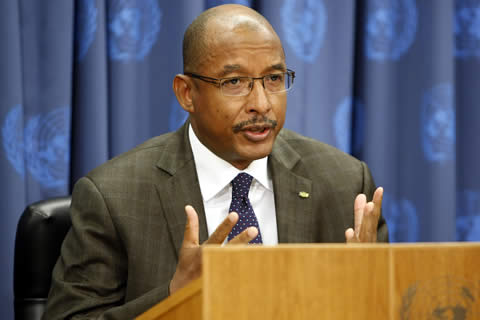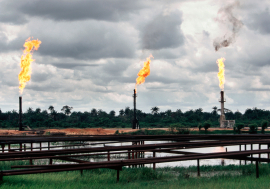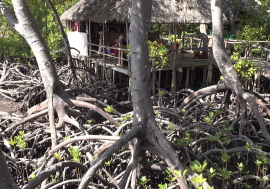Delivering on Africa’s development
 Farming in Tanzania: NEPAD is encouraging African governments to devote at least 10 per cent of their budgets to agriculture and rural development.
Farming in Tanzania: NEPAD is encouraging African governments to devote at least 10 per cent of their budgets to agriculture and rural development.As the first decade of the new millennium drew to a close, it was a time for proponents of Africa’s development to take stock. “A lot has been done,” affirms Ibrahim Assane Mayaki, the chief executive officer of the Secretariat of the New Partnership for Africa’s Development (NEPAD), the continent’s central development plan. But over the eight years since the programme’s inception, he acknowledged in an interview with Africa Renewal, there also have been “ups and downs,” and the challenges ahead remain daunting.
In certain respects, argues Mr. Mayaki, that initial period for NEPAD was something of an “experimental process,” as Africa’s governments, regional organizations and international partners tested new ways of tackling the continent’s deep poverty, weak economies and shaky political systems. Now that Africa’s continent-wide political and development institutions have found a clearer direction, he says, the real challenge of NEPAD is to show more tangible results. “Now we really have to deliver very concretely on the ground. It’s on the basis of our delivery that we have to be judged.”
NEPAD was originally adopted at a 2001 summit meeting of African leaders. The plan expressed the determination of Africans “to extricate themselves and the continent from the malaise of underdevelopment and exclusion in a globalizing world.” Within Africa, NEPAD promotes greater democracy and respect for human rights, closer trade and other economic ties among African countries and the mobilization of more domestic resources to develop the countries’ productive sectors and improve people’s well-being.
International partnerships
Externally, NEPAD advocates a new relationship between Africa and the international community, one in which non-African partners seek to complement the region’s own efforts and priorities. The United Nations, the major industrialized nations of the Group of Eight (G-8) and various donor agencies have pledged to back the African plan. “The international community has supported NEPAD since its inception,” notes Mr. Mayaki.
In annual reports to the General Assembly, the UN Secretary-General has systematically outlined the actions taken by both Africa and its partners to support NEPAD. In the most recent, issued in July, Ban Ki-moon reported that total aid to Africa, in cash terms, had increased from $29.5 bn in 2004 to an estimated $42 bn in 2008. But this was still considerably less than the G-8 had promised.
While some 20 African nations had benefited from major debt cancellations by June 2009, the Secretary-General reported, more than half are again running the risk of falling into “debt distress” because they are making less in export earnings as a result of the downturn in global trade. Meanwhile, the restrictive trade policies of major industrialized powers further hinder African exports, which is particularly “to the disadvantage of African farmers and agroproducers,” reports Mr. Ban.
Flows of foreign direct investment to Africa have risen significantly, surpassing $60 bn in 2008, according to preliminary estimates. But the world recession and tighter credit conditions in 2009 are hampering that trend.
Governance and citizenship
While NEPAD acknowledges Africa’s need for assistance from the outside, the plan emphasizes that Africans should look within for lasting solutions. In the political realm, this is reflected in an understanding that development cannot take off without sustained peace and inclusive government systems.
 Ibrahim Assane Mayaki: NEPAD is being integrated more closely into the structures of the African Union, to ensure broader political support for the programme across the continent.
Ibrahim Assane Mayaki: NEPAD is being integrated more closely into the structures of the African Union, to ensure broader political support for the programme across the continent.To help foster improvements in democratic norms and sound management, the African Peer Review Mechanism (APRM) was launched in 2003 as an outgrowth of NEPAD. Under the mechanism, teams of respected African personalities travel to various African countries to consult with governments, opposition politicians, civil society and others to assess political governance and economic management. Although participation is not mandatory, notes Mr. Mayaki, “You see more and more countries deciding to volunteer.” Thirty African governments so far have signed on to the APRM, and 12 have completed their first reviews.
At the conclusion of the reviews, participating governments generally agree to various recommendations. Ghana, for example, pledged to strengthen parliamentary oversight of the executive, Rwanda to lessen conflicts with neighbouring countries, Kenya to reduce the influence of ethnicity in political competition and South Africa to combat violence against women.
But not all countries have implemented their APRM recommendations, Mr. Mayaki concedes, noting that many governments lack the capacity to follow through. Civil society groups and the private sector also need to be more active in pressing for implementation. “You can have the best public institutions, but if you don’t have sound citizenship, then your probability of developing in a democratic way is very limited.”
From farms to schools
One example of how NEPAD is seeking to encourage the adoption of more effective policies by African governments is the Comprehensive Africa Agriculture Development Programme (CAADP). Formulated in 2003, the CAADP seeks to increase farm production in an environmentally sustainable manner so as to boost food security, provide more raw materials for African industries and raise rural incomes.
The programme reaffirms a commitment by African governments to devote at least 10 per cent of their national budgets to agriculture. “To say the truth,” Mr. Mayaki concedes, “that target has not been very well attained.”
In an effort to generate wider national support for CAADP, NEPAD’s promoters have initiated a series of broad national consultations among governments, farmers, traders and others. In October, Liberia became the eighth African country to sign a formal CAADP “compact” committing the government, farmers’ organizations, private sector and aid agencies to the programme’s goals, including the 10 per cent budget target.
Raising farm incomes and creating economic opportunities in Africa’s countryside will also be important for the continent’s long-term political stability, Mr. Mayaki observes. By generating rural employment for discontented youth, governments may be able to stabilize their political institutions. But if they fail to do so, they will be sitting on “a political bomb.”
There have been a number of other recent NEPAD initiatives and projects:
- The construction of a $1.4 bn submarine cable, called Uhurunet, to provide broadband Internet access for all coastal and island countries of Africa. The cable is scheduled to become operational before the end of 2010.
- A project to advance the teaching of science, mathematics and technology in several countries of West and North Africa.
- Numerous projects to promote women’s empowerment by providing microcredit, vocational skills, enterprise development support and other assistance. Spain has pledged €10 mn over five years, and between August 2008 and April 2009 alone its fund disbursed €6.3 mn in grants to 77 projects in 26 African countries.
- The equipping of 80 primary and secondary schools in 16 countries with computers and other information and communications technology, as part of a pilot NEPAD “e-schools” initiative to provide students with such technical skills and knowledge.
Mobilizing domestic resources
Building up Africa’s physical infrastructure — roads, railways, harbours, electricity grids, waterworks, communications networks — is another NEPAD priority. Such infrastructure will be essential if African industries, small businesses and farmers are to produce and earn more.
Building such large-scale projects is especially expensive, however. A recent World Bank study estimated that $80 bn would be needed annually to bridge Africa’s “infrastructure gap.” Part of that amount is being provided by foreign donors and investors. In 2008, commitments of financing by members of a consortium on infrastructure in Africa reached $13.7 bn, up from $12.4 bn the year before.
But the world economic downturn will make it harder to secure enough donor aid or private foreign investments. “Given that infrastructure projects need quite important amounts of resources,” notes Mr. Mayaki, “we’ll evidently face challenges in that sector.”
Such external difficulties make it even more imperative for Africa to find ways to better use its own pools of domestic financing. The potential is there, Mr. Mayaki points out. Currently, Africa spends some $40 bn annually on food imports. With sound agricultural policies and the investment of just a portion of that amount in boosting farm yields, Africa could grow much more food, drastically reduce its import bill and even earn money from food exports. In addition, about $30 bn a year is now also lost to capital flight, with about $20 bn of that amount resulting from corruption, Mr. Mayaki reports. By stemming corruption and keeping such vast sums from reaching foreign bank accounts, African countries could make more available at home for investment in infrastructure and other priority needs.
Broader African ownership
When NEPAD was first launched in 2001, Africa’s previous continental political body, the Organization of African Unity, was still in the process of transforming itself into the current African Union. Establishing the AU’s new political and security institutions took some time and attention. In that context, several African presidents took a personal lead in promoting NEPAD within Africa and abroad, and a NEPAD Secretariat was established in Pretoria, South Africa, separate from the AU headquarters in Addis Ababa, Ethiopia.
In 2007 a summit of African leaders decided to better integrate NEPAD into the AU. They envisioned replacing the NEPAD Secretariat with a new NEPAD Planning and Coordinating Agency, a process that is expected to be completed in 2010. The new agency will still be located in South Africa, but now as an integral part of the AU. Mr. Mayaki, in fact, already serves not only as NEPAD’s CEO, but also as the representative in South Africa of the chairperson of the AU Commission.
Africa Renewal asked Mr. Mayaki whether the closer integration of NEPAD into the AU reflects an effort to generate broader political responsibility for the plan within Africa, especially now that several of its early proponents — such as President Olusegun Obasanjo of Nigeria and President Thabo Mbeki of South Africa — are no longer in office.
The initial push given by those leaders “was absolutely essential” at the time, Mr. Mayaki responds. “Otherwise NEPAD would not have been seen as important.” Nevertheless, he continues, “Now we are in a phase of opening up to broader ownership, so NEPAD becomes owned by the 53 countries of the African Union.”
That effort in turn poses new challenges for NEPAD. “We have to be present more widely,” Mr. Mayaki explains, “and we have to deliver very concretely in all the regions.”















